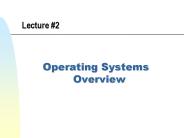Operating Systems - PowerPoint PPT Presentation
1 / 9
Title:
Operating Systems
Description:
Operating Systems Lesson 5 Plan Memory ... Memory Each process has its own ... only 1G available Operating System provides virtual memory service for processes ... – PowerPoint PPT presentation
Number of Views:62
Avg rating:3.0/5.0
Title: Operating Systems
1
Operating Systems
- Lesson 5
2
Plan
- Memory Management
- Memory segments types
- Processes Memory
- Virtual Memory
- Virtual Memory Management
- Swap File
- Memory protection and sharing
- VM for programmers
- Sample
- Locking pages in the memory
3
Memory Segments Types
- Code (system and application)
- Heap (C/C malloc/new)
- Stack (local variables and function parameters)
- Data (e.g. string constants)
4
Processes Memory
- Each process has its own address space of 4G for
code, stack, heap, data - Two processes will require 8G of RAM but theres
only 1G available - Operating System provides virtual memory service
for processes
5
Virtual Memory
- A process just thinks it has continuous 4G
address space with addresses from 0 to 4G - A virtual and physical memory is divided into
segments (page) - OS maps virtual memory pages into physical
memory pages - Every virtual memory address is translated into
physical memory address
6
Virtual Memory Mapping
- But there are still more virtual memory pages
(e.g. 8G for 2 processes) then physical memory
(e.g. 1G) - Only used virtual memory is mapped.
- Processes having same executable code share
physical pages (e.g. system code) - Rarely used pages are unloaded from physical
memory into disk and loaded back on demand when
needed. There place in physical memory will be
occupied by currently used pages.
7
Virtual Memory Swap/Page file
- Loading/Unloading memory from/to disk
- Windows c\pagefile.sys
- Memory hit
- Process is accessing page which is already in
physical memory. Fast - Memory miss/Page fault
- Other page should be unloaded to disk and
required page loaded. Slow
8
Virtual Memory Protection
- Process access permissions for a page
- Code execute but do not modify
- Data Read, no execute but no write
- Stack/Heap write/read but no execute
- Special cases
- Debugger has read/write access to other process
code/data page - Several processes might have shared data pages to
work on common data
9
VM For programmers
- Dont use too much memory. VM misses will slow
your computer and will kill your hard disk - Put data that are used together close in the
memory (e.g. struct of arrays vs. array of
struct), so youve better chances to have them in
a single page. - Put shared code and data into shared code
libraries (DLLs) so there will be no duplicate
code/data pages in the physical memory































